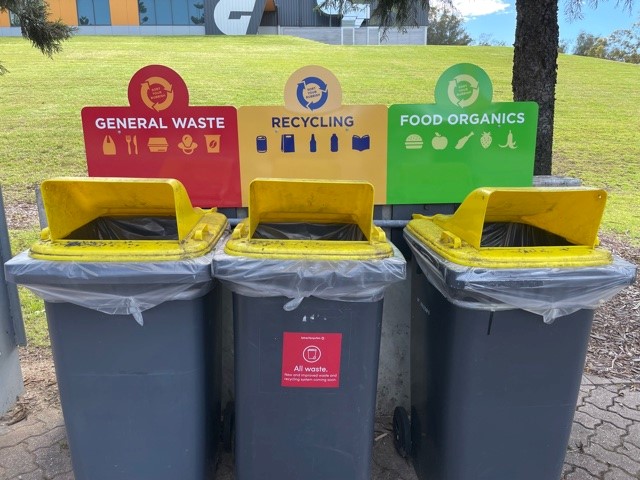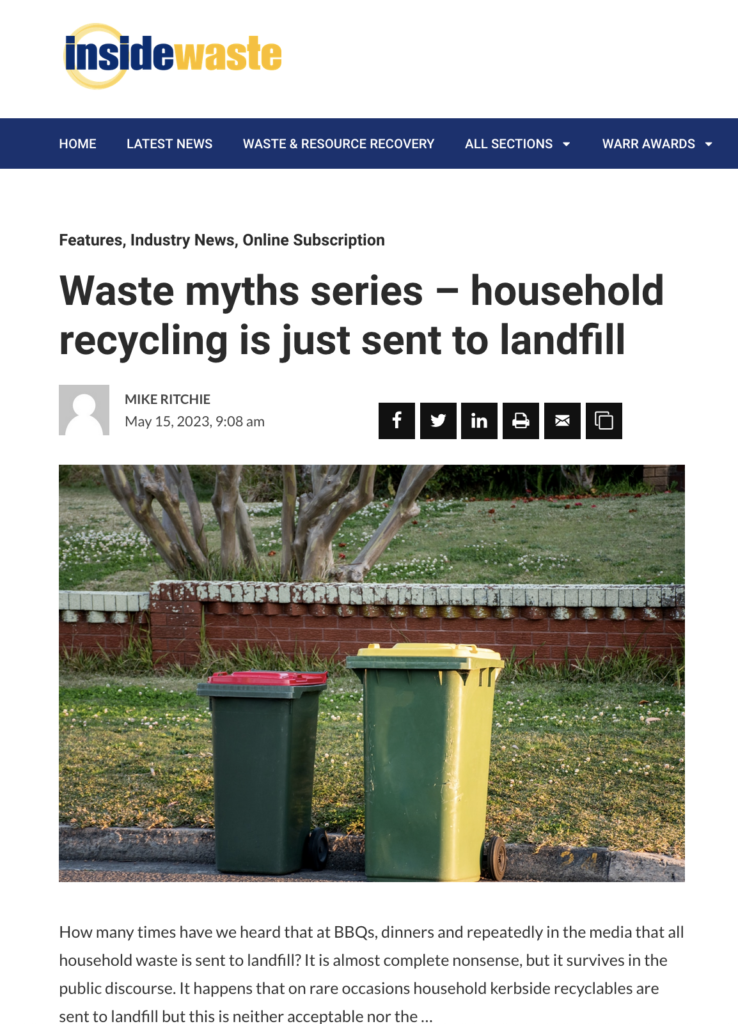Waste myth #4: Household recycling sent to landfill

By Mike Ritchie, Director, MRA Consulting Group
How many times have we heard that at BBQ’s, dinners and repeatedly in the media?
It is almost complete nonsense, but it survives in the public discourse.
It happens that on rare occasions household kerbside recyclables are sent to landfill but this is neither acceptable nor the norm. I explain the reasons for which this might happens later on.
But a few facts first.
- We collect and recycle 1.9 MT of kerbside recyclables per year in Australia. (5% of Australia’s recycling, with the other 35MT being recycled from the commercial and building sectors.)
- There is a $15B industry built up around recycling and they want this recycling feedstock. They do NOT want it going to landfill. Think paper mills, plastic milk bottle makers, coke bottle makers etc.
- In most of Australia, landfilling household recyclables is more expensive now than recycling, so it does not make commercial sense for collection companies to send it to landfill.
- It is also a breach of contract between Council and the collection contractor and constitutes grounds for contract termination in all the contracts that MRA writes. It is common in most contracts.
- It massively hurts company and Council reputations when it happens.
So it doesn’t happen very often.
Let me explain the reasons it could happen (occasionally):
- A recycling truck breaking down might lead an operator to make a decision to collect remaining bins on that run in a red truck (so that the service is provided) and these bins go to landfill with other general waste. Without permission from Council, this is a breach of contract and is heavily penalised when it becomes known by the Council. It is usually grounds for contract termination. Generally, lots of butts get kicked when it is found out usually by senior management in the Collection Contractor. They don’t want their contract put at risk.
- A lazy driver does it to save work for himself or a buddy. Drop the last yellow bins into the red (residual) truck to save going back to the depot or MRF. Again, a breach of contract, grounds for termination and always butt kicking. Not good and never encouraged. But it does happen occasionally and industry always tries to stamp it out.
- There is a breakdown in the supply chain, and landfill is the only remaining solution. We have seen the recycling industry store materials in sheds for years at great expense just so that they don’t have to landfill it. That is the responsible thing to do but the media always reports it as a rort. If a downstream processor for whatever reason cannot take the material and there are no other offtakers in the market, then stockpiling is the best solution. Think of the glass warehouse story or the recent troubles Redcycle has been having with plastic. None went to landfill. But it cannot be stored indefinitely so at some point EPAs usually require it be removed and landfilled. Unfortunate but unavoidable.
That is about it.
If we didn’t recycle that 1.9 MT of recyclables our landfills would be filling up even faster than they are today. It would be a nightmare.
Tweet

Industry has invested at least $20B in paper mills, plastic processing plants, MRFs, glass processing to service this 1.9MT of material coming out of households. They would be up in arms if they knew that a company was deliberately sending recyclables to landfill. That is a direct threat to their business model and to the jobs of about 10,000 workers across Australia.
We employ 3 times more people in recycling than we do in landfill.
If someone asked me how many kerbside recyclable tonnes are landfilled per year I would say a maximum 1000 t across Australia. That is of course a guess, but it is 0.05% of kerbside material that is collected and recycled. Bear in mind that contamination in the yellow bin is 12% or 228,000t. Contamination is a FAR bigger issue.
Will this article make any difference to the media? Probably not but at least I have tried to defend the industry I strongly support for its brilliant environmental record, for its massive contribution to greenhouse gas abatement and to the fact it makes circular over 37 MILLION tonnes of material per year.
Mike Ritchie is the Managing Director at MRA Consulting Group.
This article has been published by the following media outlets:




